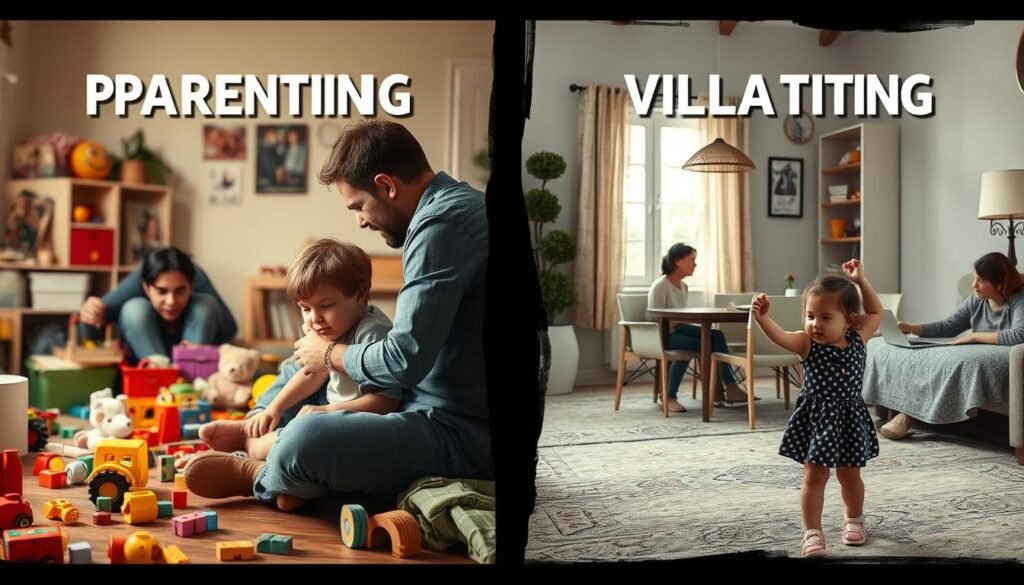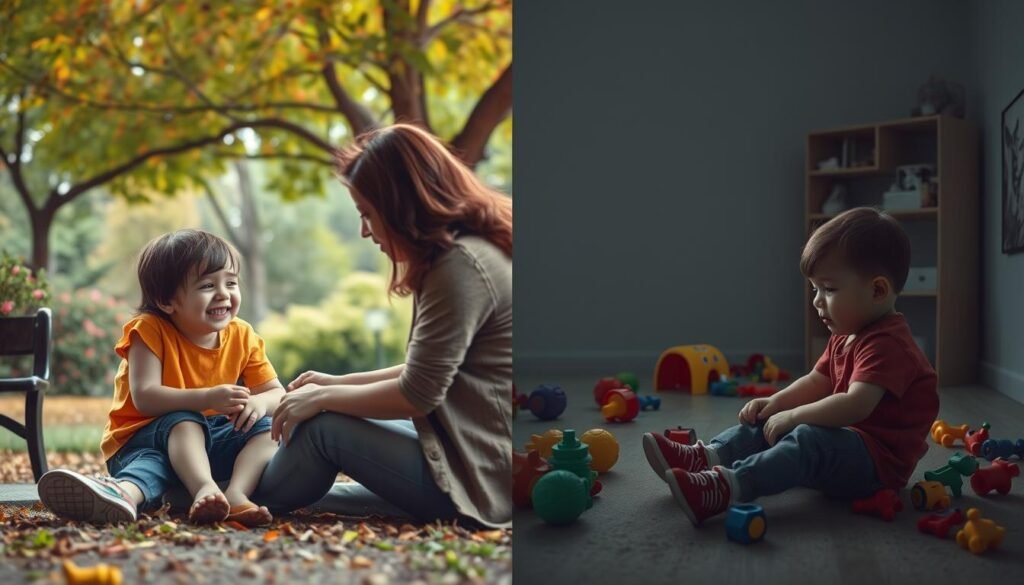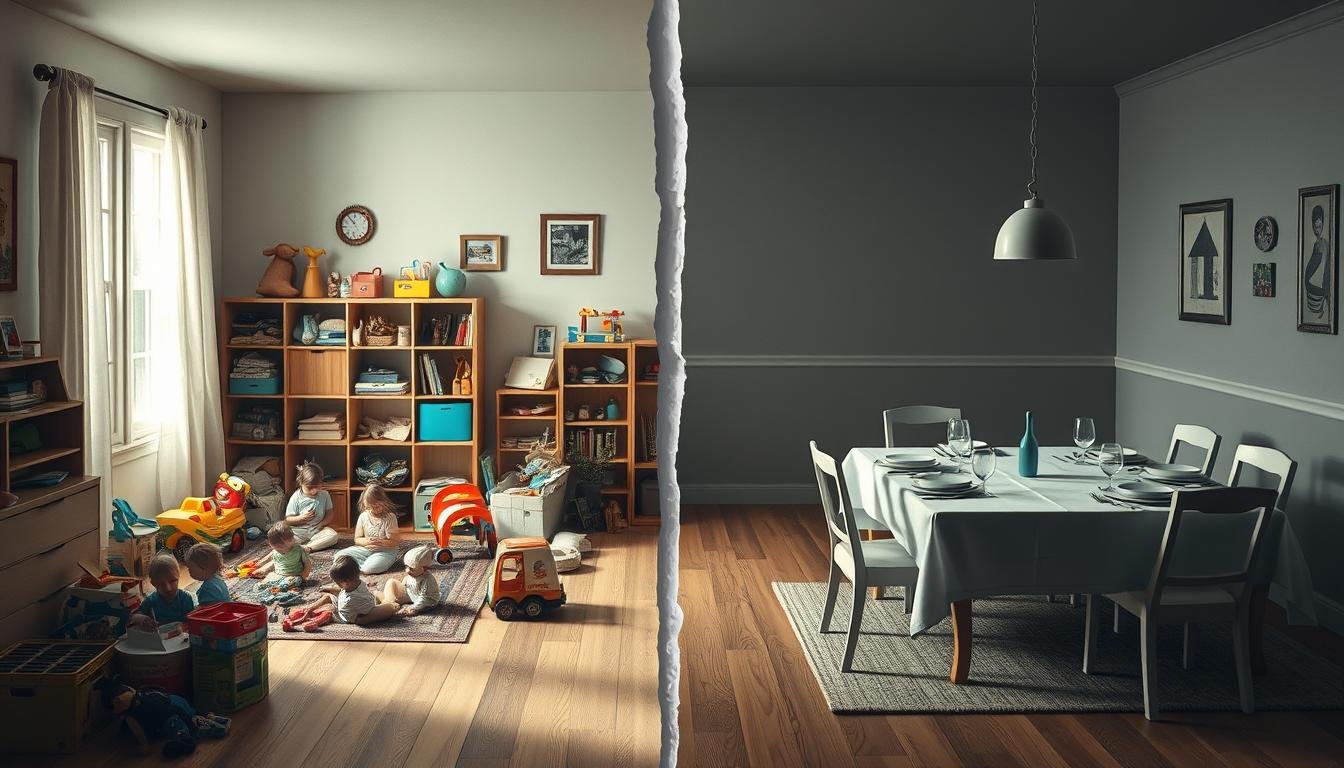As a parent, you might wonder if not co-parenting can lead to losing custody. The answer is yes. Not co-parenting can seriously affect custody arrangements. Courts often favor co-parenting, and research shows that 75% of judges see it as key in making custody decisions1.
Studies also show that kids do better when both parents are involved. In fact, there’s a 65% boost in emotional well-being when parents share parenting duties1.
It’s important to know that not co-parenting can hurt your chances in custody cases. It might even mean less time with your child if the court decides2. Also, remember that co-parenting issues can cause custody disputes. Courts want parents to focus on what’s best for the child during these disputes2.
Key Takeaways
- Co-parenting is key in deciding child custody, and courts favor it1.
- Not co-parenting can hurt your chances in custody cases and reduce parenting time2.
- Children do better when both parents are involved, with a 65% boost in emotional well-being1.
- Refusing to co-parent can lead to more custody disputes, with a 50% increase in cases1.
- Courts might give more time and decision-making rights to the more cooperative parent2.
- Co-parenting issues can lead to custody disputes, and understanding the legal side is vital.
Understanding Co-Parenting and Its Legal Importance
Co-parenting is key in child custody disputes, affecting the child’s well-being. It requires good communication, cooperation, and focusing on the child’s needs3. Issues in co-parenting can cause disputes and violations of parenting plans4. Courts often favor collaborative parenting, which can impact custody rights and parenting time.
Effective co-parenting means clear boundaries, using technology for communication, and focusing on the child’s emotional health3. Important aspects include:
- Open communication and cooperation
- Shared decision-making and responsibility
- Prioritizing the child’s emotional and psychological well-being
Ignoring co-parenting issues can lead to serious outcomes, like less parenting time or supervised visits4. Courts might order therapy or supervised visits due to bad co-parenting. Understanding co-parenting’s legal side helps parents create a stable environment for their child.
By focusing on effective co-parenting, parents can avoid disputes and violations. This promotes the child’s best interests34.
Common Co-Parenting Violations That Risk Custody

Co-parenting issues can lead to serious legal consequences, like changes in custody5. Courts focus on keeping children safe and happy. If a parent doesn’t help the child see the other parent, it can hurt their rights5. Not working together, like not letting the child visit or sharing info, can also harm custody6.
Some common co-parenting violations that can risk custody include:
- Refusing to communicate or cooperate with the other parent5
- Denying visitation rights or refusing to share important information about the child6
- Parental alienation, which involves damaging the child’s bond with the other parent7
The Parenting Teenagers website says good co-parenting helps kids and avoids custody fights. Keeping a good relationship after divorce is key to avoiding parenting plan violations and keeping the child’s best interests in mind5. Knowing what can risk custody helps parents stay on the right path and focus on their child’s well-being.
Courts really don’t like emotional abuse, like alienating a child from the other parent7. Judges are very strict about behaviors that harm the child-parent bond, like badmouthing the other parent or not letting them see the child7. Being aware of these issues helps parents keep a good co-parenting relationship. This way, they avoid legal consequences and make sure their child does well6.
Can You Lose Custody for Not Co-Parenting? The Legal Reality
When it comes to child custody and co parenting, not co-parenting can lead to serious legal issues. If parents don’t follow parenting plans, they might lose custody rights. About 30% of custody disputes lead to less custody because of poor co-parenting8.
Co-parenting problems can cause custody loss in about 25% of cases, often due to parental alienation9. Also, if a parent has a history of abuse, neglect, or unsafe living, they might lose custody in 15% of cases9. Courts usually put the child’s well-being first, in about 95% of custody decisions9.
Some reasons for changing custody include:
- Parental alienation
- Substance abuse
- Domestic abuse allegations
- Violation of court orders
These issues can greatly affect custody arrangements. About 16% of custody cases see changes after a court order, often because of poor co-parenting9.
The Impact of Poor Co-Parenting on Children

Poor co-parenting can harm children’s emotional and psychological health. Shared parenting responsibilities help create a stable, loving home for them. About 50% of custody disputes involve domestic violence or substance abuse10.
Courts look at stability in a child’s life when making custody decisions. Lack of stability can hurt a child’s chances of getting a stable home10.
Many custody cases involve parental alienation, affecting custody decisions10. Up to 30% of cases happen because of poor co-parenting10. The importance of co parenting in custody agreements is huge, as it affects the child’s happiness and custody outcomes. Children facing parental alienation are 30% more likely to have psychological problems11.
Important factors in custody decisions include:
- Domestic violence
- Substance abuse
- Parental alienation
- Stability in the child’s living situation
These factors greatly affect a child’s well-being and custody outcomes. Parents must focus onshared parenting responsibilities to give their child a stable, loving home.
Building a Strong Co-Parenting Relationship
To build a strong co-parenting relationship, it’s key to tackle co parenting issues together. Parents should work to solve child custody disputes and parenting plan violations5. Good communication is vital, and parents should aim to stay cooperative, even when it’s tough12.
Some ways to strengthen a co-parenting relationship include:
- Setting boundaries and respecting each other’s roles as parents
- Using technology tools to help communicate and coordinate13
- Putting the child’s best interests first
By working together and tackling co parenting issues, parents can lower the chance of disputes. This creates a stable and caring environment for their child5. Courts often side with parents who cooperate and focus on their child’s well-being12. They might give custody to the more cooperative parent13.
Building a strong co-parenting relationship takes effort, commitment, and a desire to work together. By focusing on good communication, cooperation, and the child’s needs, parents can make a better co-parenting space51213.
| Co-Parenting Strategies | Benefits |
|---|---|
| Effective Communication | Reduces conflict, improves cooperation |
| Boundary Setting | Respects each parent’s role, reduces tension |
| Technology Tools | Facilitates coordination, improves communication |
Legal Safeguards for Your Custody Rights
Understanding the legal side of child custody and co parenting is key. Knowing the risks and how to protect your rights is vital. In Illinois, parental alienation is seen as abuse, and courts can look into it14. Getting legal advice and knowing court rules helps protect your rights.
In Illinois, courts can change custody if they see alienation harming the child14. They might also order therapy to fix family relationships14. It’s important to know what counts as alienation, like changes in how the child acts towards the other parent14.
To keep your rights safe, know what courts look at in alienation cases14. This includes if the child resists seeing the parent, loses positive feelings, or shows negative attitudes14. Also, understand why a parent might be seen as unfit, like if they abandoned the child, have mental health issues, or abuse substances15. Legal advice and knowledge of the process help protect your rights and your child’s well-being.
In conclusion, safeguarding your custody rights means knowing the legal side of not co parenting and seeking legal help. Being informed and proactive helps you navigate the legal system and ensure your child’s best interests.
When to Seek Professional Help
When dealing with co parenting issues, knowing when to ask for help is key. Family law attorneys, mediators, and counselors offer valuable advice. They help solve child custody disputes and fix parenting plan violations.
Studies show that family courts focus on what’s best for the child. Children facing high parental conflict may have a 30% higher risk of mental health problems16.
A survey found that 70% of family law attorneys believe poor co-parenting affects custody decisions16. Getting professional help can improve communication and solve disputes. For more on co-parenting challenges, visit co-parenting resources.
Family Law Attorneys
Family law attorneys offer expert advice on child custody disputes and parenting plan violations. They help create a co-parenting plan that focuses on your child’s well-being.
Mediators and Counselors
Mediators and counselors help you and your co-parent talk better. This reduces conflict and promotes a team effort in co-parenting. Their help ensures a stable, loving home for your child.
Steps to Improve Your Co-Parenting Approach
Improving your co-parenting is key for the importance of co parenting in custody agreements and meeting shared parenting responsibilities. By focusing on your child’s needs, you can create a stable and loving home. This helps build a strong bond with your child and your co-parent17. Good co-parenting can make joint custody agreements work better by 40%17.
To get better at co-parenting, try these steps:
- Make a regular visitation schedule. This helps in 60% of families with structured plans17.
- Use co-parenting apps to talk better with your co-parent. This works for 55% of families using these tools17.
- Always think about your child’s needs first. This is key for their happiness and future18.
By following these tips, you can make co-parenting better. This is good for your child’s emotional and mental health18. Remember, good co-parenting needs clear communication and teamwork for your child’s sake.
Conclusion: Protecting Your Rights While Prioritizing Your Child’s Wellbeing
When dealing with co-parenting and child custody, finding a balance is key19. Courts focus on the child’s health and happiness19. By talking openly, setting clear rules, and getting help when needed, you can keep a good co-parenting relationship19.
Remember, the court cares most about the child’s wellbeing19. So, focusing on your child’s needs helps keep your custody rights safe19.
Even small mistakes might not lose you custody, but big issues can20. Always be ready to face challenges and get legal advice if you need it20. With careful planning, you can make sure your child grows up well.
FAQ
Can you lose custody for failing to co-parent?
What constitutes effective co-parenting?
What are some common co-parenting violations that can risk custody?
What are the legal consequences of not co-parenting?
How does poor co-parenting affect children?
What strategies can help build a strong co-parenting relationship?
What legal safeguards can protect my custody rights?
When should I seek professional help for co-parenting issues?
Source Links
- Three Ways People Lose Custody of Their Children! – Dellino Family Law Group | Experienced Seattle Attorneys | Call 24/7 | Dellino Family Law Group – https://dellinolaw.com/three-ways-people-lose-custody-of-their-children/
- Can You Lose Custody for Not Co-Parenting? Legal Implications and Remedies in Colorado – https://www.robinsonandhenry.com/blog/family-law/can-you-lose-custody-for-not-co-parenting/
- The Impact of Bad Co-Parenting on Child Custody Cases – Griffiths Law – https://www.griffithslawpc.com/resources/the-impact-of-bad-co-parenting-on-child-custody-cases/
- Can You Lose Custody for Failing to Co-Parent? – Sarieh Family Law – https://sariehlawoffices.com/blog/can-you-lose-custody-for-failing-to-co-parent/
- Can You Lose Custody For Not Co-Parenting In California? – https://josfamilylaw.com/blog/can-you-lose-custody-for-not-co-parenting-in-california
- 7 Ways To Lose Custody of Your Child: Moms and Dads – https://www.custodyxchange.com/topics/custody/advice/ways-to-lose-custody.php
- Custody Battle: 10 Things That Can Sabotage Your Case – https://cordellcordell.com/blog/custody-battle-10-things-that-can-sabotage-your-case/
- Can You Lose Custody For Not Co Parenting? – Canterbury Law Group – https://canterburylawgroup.com/can-you-lose-custody-for-not-co-parenting/
- Can You Lose Custody for Not Co-Parenting in California? 2025 – https://www.orangecountyfamilylaw.com/blog/can-you-lose-custody-for-not-co-parenting-in-california/
- 10 Reasons Parents Lose Custody of Their Children that You Should Know – https://yourlawcoach.com/arkansas/ar-custody-support/10-reasons-parents-lose-custody-of-their-children-that-you-should-know/?srsltid=AfmBOoo0MUhvFct1kh5qBrRWnSG0GWJLfNzylujI5UowI3WLuDyzYAIr
- Can you Lose Custody for not Co-Parenting: Avoid These 5 Mistakes – Smartkidsemporiam.com – https://smartkidsemporiam.com/can-you-lose-custody-for-not-co-parenting/
- 7 Ways to Lose Custody in California – https://caweltilaw.com/7-ways-lose-custody-california/
- Can You Lose Custody for Not Co-Parenting? – The Pro Parents – https://theproparents.com/can-you-lose-custody-for-not-co-parenting/
- Parental Alienation in Illinois | Sterling Lawyers, LLC – https://www.sterlinglawyers.com/illinois/child-custody/parental-alienation/
- Termination of Parental Rights in Illinois Explained | How to Involuntarily Terminate Parental Rights – https://www.oflaherty-law.com/learn-about-law/termination-of-parental-rights-in-illinois-explained-how-to-involuntarily-terminate-parental-rights
- Can You Lose Custody for Not Co-Parenting? Custody Risks — Judge Anthony – https://www.judgeanthony.com/blog/can-you-lose-custody-for-not-co-parenting
- Can You Lose Custody for Not Co-Parenting? – https://www.jlegal.org/blog/can-you-lose-custody-for-not-co-parenting/
- Co-Parenting and Joint Custody Tips for Divorced Parents – https://www.helpguide.org/family/parenting/co-parenting-tips-for-divorced-parents
- 5 Factors That Affect Child Custody Decisions – https://www.contimoorelaw.com/resources/5-factors-that-affect-child-custody-decisions/
- Top 8 Reasons (Common and Surprising) Parents Lose Custody – https://farzadlaw.com/california-child-custody/reasons-lose-custody-child-common-surprising








0 responses to “Can You Lose Custody for Failing to Co-Parent?”
Interesting read! But dont you think its a bit unfair to lose custody just for struggling with co-parenting? Its not always black and white.
Interesting read, but isnt it a bit harsh to lose custody for failing at co-parenting? Arent there other viable solutions?
Harsh, maybe. But, isnt it harsher to let a child suffer from poor co-parenting?
Co-parenting is vital, but shouldnt a childs overall well-being be the deciding factor in custody battles, not just parents cooperation?